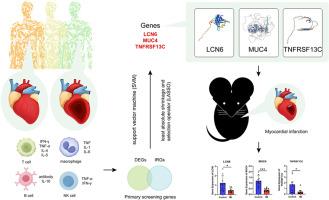Potential diagnostic biomarkers in heart failure: Suppressed immune-associated genes identified by bioinformatic analysis and machine learning
IF 4.2
3区 医学
Q1 PHARMACOLOGY & PHARMACY
引用次数: 0
Abstract
Heart failure (HF) threatens tens of millions of people's health worldwide, which is the terminal stage in the development of majority cardiovascular diseases. Recently, an increasing number of studies have demonstrated that bioinformatics and machine learning (ML) algorithms can offer new insights into the diagnosing and treating HF. To further discover HF diagnostic genes, we utilized least absolute shrinkage and selection operator (LASSO) and Support Vector Machine (SVM) to identify novel immune-related genes. The HF dataset was obtained from the gene expression omnibus (GEO) database and three candidate genes (LCN6, MUC4, and TNFRSF13C) were finally screened. In addition, the myocardial infarction (MI) modeling experiments on mice were performed to validate the expression of LCN6, MUC4, and TNFRSF13C on experimental HF mice. Altogether, these three candidate genes are promising targets for the prediction of HF with immunological perspective.

心力衰竭的潜在诊断生物标志物:通过生物信息学分析和机器学习识别的抑制免疫相关基因
心力衰竭(HF)威胁着全球数千万人的健康,是大多数心血管疾病发展的终末阶段。最近,越来越多的研究表明,生物信息学和机器学习(ML)算法可以为诊断和治疗高血压提供新的见解。为了进一步发现高频诊断基因,我们利用最小绝对收缩和选择算子(LASSO)和支持向量机(SVM)来识别新型免疫相关基因。高频数据集来自基因表达总库(GEO)数据库,最终筛选出三个候选基因(LCN6、MUC4 和 TNFRSF13C)。此外,为了验证 LCN6、MUC4 和 TNFRSF13C 在实验性 HF 小鼠上的表达,还进行了小鼠心肌梗死(MI)模型实验。总之,这三个候选基因有望成为从免疫学角度预测心房颤动的靶点。
本文章由计算机程序翻译,如有差异,请以英文原文为准。
求助全文
约1分钟内获得全文
求助全文
来源期刊
CiteScore
9.00
自引率
0.00%
发文量
572
审稿时长
34 days
期刊介绍:
The European Journal of Pharmacology publishes research papers covering all aspects of experimental pharmacology with focus on the mechanism of action of structurally identified compounds affecting biological systems.
The scope includes:
Behavioural pharmacology
Neuropharmacology and analgesia
Cardiovascular pharmacology
Pulmonary, gastrointestinal and urogenital pharmacology
Endocrine pharmacology
Immunopharmacology and inflammation
Molecular and cellular pharmacology
Regenerative pharmacology
Biologicals and biotherapeutics
Translational pharmacology
Nutriceutical pharmacology.

 求助内容:
求助内容: 应助结果提醒方式:
应助结果提醒方式:


